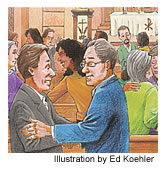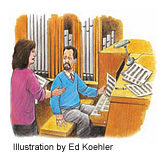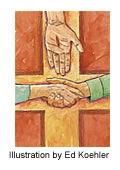‘Passing the peace’ is more than just saying hello on Sunday morning.
 by Ted Kober and Eric Sahlberg
by Ted Kober and Eric Sahlberg
“Let’s take a moment to greet those around you.”
For many of you, these are familiar words from your pastor.
Yep, it’s time for the “Holy Howdy,” where worshipers move to shake hands with those around them, noisily sharing the Lord’s peace. The socialites in the pews love this chaotic break in an otherwise austere setting, while more reserved folks quietly endure this dreaded ritual.
And yet, unnoticed in the buzz, are a few people who successfully steer clear of each other. They tend to sit far enough apart, or have learned which service to attend, to avoid contact. These are the brothers and sisters in Christ whose relationships are broken; yet they worship and commune in the same body.
First, Go and Be Reconciled
St. Paul urged two such sisters to be reconciled in the church at Philippi: “I plead with Euodia and I plead with Syntyche to agree with each other in the Lord” (Phil. 4:2 NIV). He further instructed a fellow member to assist them if necessary: “Yes, and I ask you, loyal yokefellow, help these women who have contended at my side in the cause of the Gospel, along with Clement and the rest of my fellow workers, whose names are in the Book of Life” (v. 3).
 Restoring broken relationships within the body is the business of the church.
Restoring broken relationships within the body is the business of the church.
Our unity in Christ is a profound truth that means more than just belonging to the same church. We belong to Christ’s body, and He calls us to demonstrate our unity in Him by the way we love one another (John 13:34–35). Because of Christ, we belong to each other.
Our unity is not dependent on the moral perfection of disciples, but rather on what God has done for us in Christ. Because we are God’s reconciled children, we are urged to practice reconciliation by confessing our sins and forgiving one another as God through Christ has forgiven us.
It is in the context of exhorting two believers to be reconciled that Paul wrote these familiar words: “And the peace of God, which transcends all understanding, will guard your hearts and minds in Christ Jesus” (Phil. 4:7).
Conflict and the Lord’s Supper
The early Church recognized the importance of seeking reconciliation before worship. It took seriously Jesus’ admonition in Matt. 5:23–24: “Therefore, if you are offering your gift at the altar and there remember that your brother has something against you, leave your gift there in front of the altar. First, go and be reconciled to your brother; then come and offer your gift.”
Addressing their numerous divisions, St. Paul admonished the Corinthians to reconcile. He noted their disunity was especially offensive as they celebrated the Lord’s Supper together (1 Cor. 10:14–22; 11:17–34). To celebrate the unity we have together in Christ while divisions and factions remain among us is a contradiction of our faith.
Thus, the believers practiced the “kiss of peace” during their worship. Greeting each other with a holy kiss (cf. 1 Cor. 16:20), they shared: “The peace of the Lord be with you.” If anyone had difficulty sharing the peace because of unresolved issues, they were urged to reconcile before taking Communion.
In early Christian liturgies, this practice occurred at the end of the Service of the Word or at the beginning of the Eucharistic section. The purpose: To encourage any who had unresolved conflicts to be reconciled before celebrating the Lord’s Supper at the same table. A form of the “passing of the peace” exists in some of our Lutheran worship services today. In Lutheran Service Book (LSB), this direction is indicated in Divine Service, Setting 1, after the Prayer of the Church and before the offering (p. 159):
Following the prayers, the people may greet one another in the name of the Lord, saying, “Peace be with you,” as a sign of reconciliation and of the unity of the Spirit in the bond of peace (Matt. 5:22–24; Eph. 4:1–3).
Encouraging worshipers to casually greet one another and meet visitors can be a useful practice, especially in a society where we tend to self-isolate or talk only to those we know. But common niceties cannot replace the necessity to “make every effort to keep the unity of the Spirit through the bond of peace” (Eph. 4:3) among God’s children.
Is Reconciliation Really Necessary Today?
Reconciliation within the congregation is as necessary today as it was in the first-century church. I (Eric) was once part of a church that lacked reconciliation, much like the church in Philippi. A modern-day Euodia and Syntyche belonged to my church but were at odds with one another. Disagreements among the members came in all sizes. Disputes ranged from the petty to the significant. The atmosphere became painful for everyone. Hearts were heavy and church life seemed to be on pause. It’s so true that when one part of the body suffers, we all suffer (1 Cor. 12:26).
Perhaps you have experienced similar roadblocks in the life of your congregation. My church followed Paul’s counsel to the Philippians (4:3). The church engaged a third-party yokefellow who helped lead us in reconciliation. Sins were confessed, forgiveness was given, and relationships restored. Healing within the body of Christ had begun.
 Sometimes we aren’t even aware of relationships that need reconciliation, as the following story illustrates. (I have revised the details to maintain confidentiality.) Some time ago I met a friendly middle-aged woman. She was remarried and the mother of a small child. She shared that she had a teenage daughter from a previous marriage who lived less than 20 minutes away. The woman’s countenance fell as she expressed concerns about her daughter’s struggles, including her choice of friends and clothing, and the difficulty she had communicating with her. Then her face lit up as she introduced her new husband and her three-month-old son.
Sometimes we aren’t even aware of relationships that need reconciliation, as the following story illustrates. (I have revised the details to maintain confidentiality.) Some time ago I met a friendly middle-aged woman. She was remarried and the mother of a small child. She shared that she had a teenage daughter from a previous marriage who lived less than 20 minutes away. The woman’s countenance fell as she expressed concerns about her daughter’s struggles, including her choice of friends and clothing, and the difficulty she had communicating with her. Then her face lit up as she introduced her new husband and her three-month-old son.
This woman had moved on; her daughter had not. She mourned for the “good old days.” The daughter’s heart suffered with the pain of a broken family.
The girl rarely saw her mother. Every other weekend she would visit her mother at her new home. Although she yearned for the family of her past, her mother was now focused on life with her new family. The teenage daughter was the child from the other marriage.
The mother worshiped at one church, the daughter at another. They were not reconciled. Who in their congregations knew about their brokenness, and what roles ought their churches play in helping them reconcile?
God forgives us through Jesus Christ. And Christ calls us to share the gift of forgiveness with others: “Be kind and compassionate to one another, forgiving each other, just as in Christ God forgave you” (Eph. 4:32).
A Contemporary ‘Kiss of Peace’
Can today’s church really reclaim what the Scriptures teach and what our church fathers practiced?
While kissing others in public greetings is not part of our culture, the sharing of Christ’s peace in reconciliation is just as valid today as in the ancient church.
In one congregation where I (Ted) served as a reconciler, conflict between the elders and the church council polarized the church. Church attendance declined and offerings fell. Many stopped talking to one another—but had no difficulty in gossiping about one another. Blameshifting replaced repentance and became a substitute for true justification.
With Bible study and assistance through mediation, the two leadership boards reconciled through confession and forgiveness. Encouraged to share their restoration, they agreed to jointly confess their sins to the congregation in worship, just prior to the offering, in accord with Matt. 5:23–24. The visiting pastor led the congregants in announcing God’s grace to them. These restored lay leaders then reminded their members that many of them also needed reconciliation and suggested they take this opportunity to do so.
What happened next was a miracle. For 30 minutes people moved across the sanctuary to share God’s peace with those with whom they had broken relationships. Many approached people they had ignored for months. Tears were shed amid quiet confession and sharing of forgiveness. As the Holy Supper was celebrated, more tears flowed. No one complained about the long service. Afterward, visitors reported being awed that these people actually practiced what they believed.
Help for Individuals in Conflict
 Marsha first learned about the original intent of the “kiss of peace” in a peacemaking seminar. The next day in worship, she quietly made her way to the balcony during the offering. Her church shared the peace before Communion. Marsha held a well-known grudge against Mark, the organist (not their real names). She reached her hand out to Mark: “I’m so sorry. I can’t believe I’ve let our
Marsha first learned about the original intent of the “kiss of peace” in a peacemaking seminar. The next day in worship, she quietly made her way to the balcony during the offering. Her church shared the peace before Communion. Marsha held a well-known grudge against Mark, the organist (not their real names). She reached her hand out to Mark: “I’m so sorry. I can’t believe I’ve let our
disagreements come between us. The peace of the Lord be with you.” The whole church learned what happened when Marsha and Mark walked down the aisle together for Communion. Everyone witnessed in them the peace of God that transcends all understanding!
Introducing the ‘Kiss of Peace’ in Your Church
Pastor Schultz (not his real name) chose Ash Wednesday to introduce this new-old ritual to his congregation. He spent a few weeks teaching and preparing his members for reconciliation during the passing of the peace. He indicated that during the middle of the service they would take 10 minutes to reach out to those with whom they needed to be reconciled. A few threatened to boycott the service; others grumbled quietly.
But when the evening arrived, the church was full, and the members surprised themselves that they were ready. Some simply went through the motions, but others were moved to seek reconciliation. A father shared with me (Ted) how his teenage son sought him out during the sharing of peace.
“I didn’t realize something had grown between us, but I’m sure glad we had the chance to do something about it. I am so grateful for our pastor!”
Isn’t Reconciliation Risky Business?
 Reconciliation is never easy. In many ways, the “holy howdy” is safer and more comfortable than the original “kiss of peace.” And casual greetings are important!
Reconciliation is never easy. In many ways, the “holy howdy” is safer and more comfortable than the original “kiss of peace.” And casual greetings are important!
But what Jesus endured for our reconciliation was anything but safe or comfortable. He suffered a horrific death to restore us to His Father while we were yet sinners. We receive His forgiveness in His very body and blood, celebrating our unity in Him as we commune together at His table.
Remembering what He has done for us, perhaps we should purposely distinguish the exchanging of Christ’s peace from our informal greetings. Living reconciliation is a more solemn yet incredibly joyful experience of the peace that transcends all understanding!
‘Passing the Peace’: Some Things to Consider
To introduce your church to the original purpose of the passing of the peace, consider the following:
- Select an appropriate date and give advance notice. Choose a time that will allow for a longer worship service.
- Take time to study God’s Word about peacemaking and its relationship to unity in the body of Christ.
- Use Bible classes, church newsletters, and bulletins to announce the special event.
- Be prepared to coach people who are preparing for the event.
- Rather than offer this during every Communion service, use special times to celebrate this ritual with more intentional effort (such as during Lent or Advent).
- Allow people the freedom to participate as they feel ready, encouraging those who are not ready to meditate on a Scripture reading, hymn, or prayer.
- Pray that God will bless your “kiss of peace.”
Resources
Check these resources from Ambassadors of Reconciliation (www.hisaor.org) to help prepare your church:
- Blessed Are the Peacemakers (a Bible study).
- Confession and Forgiveness (by Ted Kober, CPH, 2002).
- Lifestyles of Reconciliation. A DVD with several stories of true reconciliations.
- “Announcing God’s Grace.” A pamphlet to guide people in confession and forgiveness.
- “Family Confession and Forgiveness.” A chancel drama.
—T.K.; E.S.
‘The Ambassadors of Reconciliation’
The Ambassadors of Reconciliation™ is an international ministry founded to equip Lutherans and their churches for living, proclaiming, and cultivating lifestyles of reconciliation. The ministry of reconciliation is given to the local church and every believer. The purpose of the Ambassadors of Reconciliation is to inspire and prepare the leaders of Christ’s church around the world to carry out this vocation in more effective ways. The Ambassadors of Reconciliation is a nonprofit organization and a Recognized Service Organization of The Lutheran Church—Missouri Synod. Its approach is based on the Holy Scriptures and the Lutheran Confessions. For more information, visit www.hisaor.org.





